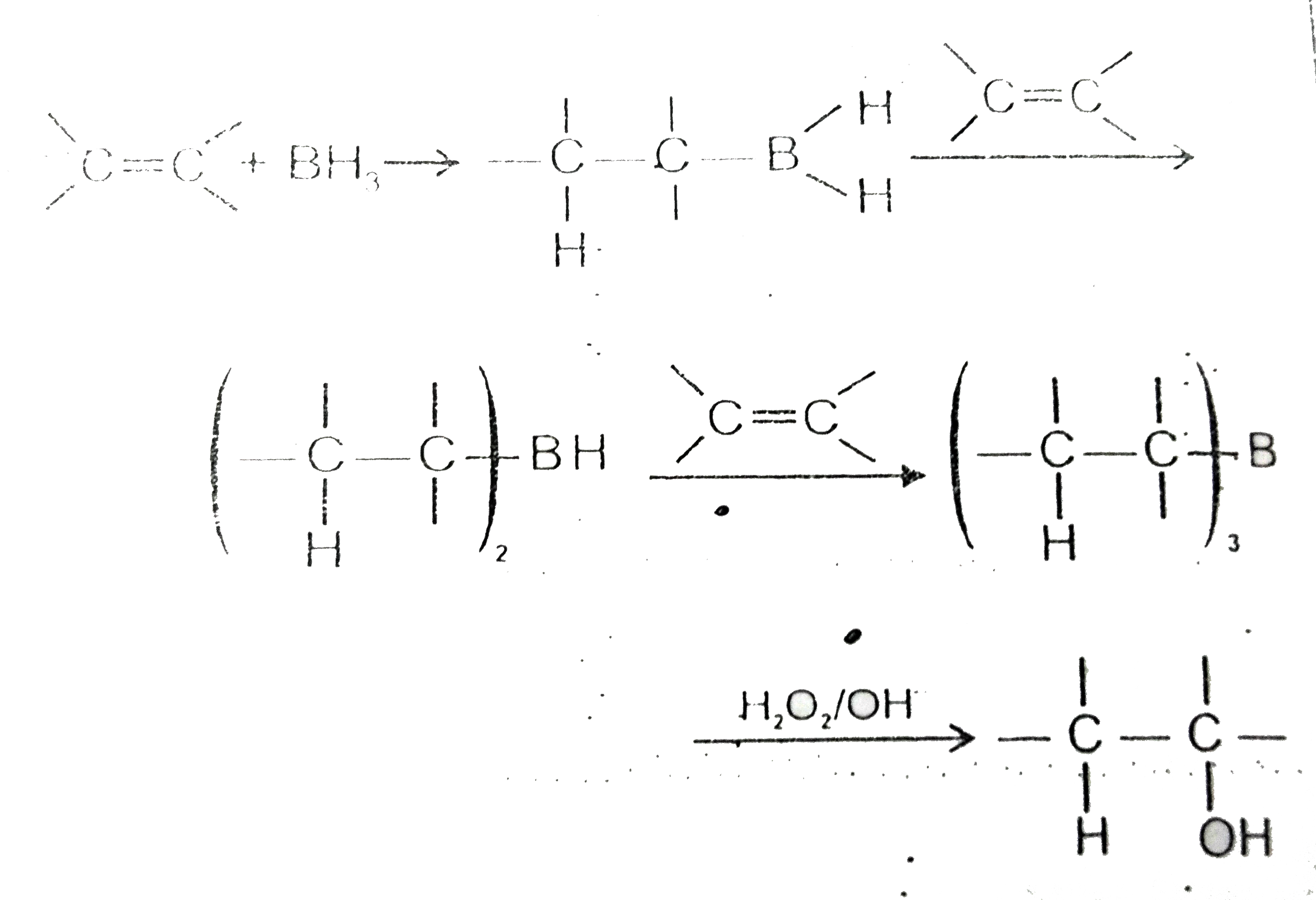Propene on hydroboration and oxidation produces
CH3CH2CH2OH
CH3CHOHCH3
CH3CHOHCH2OH
CH3CH2CHO
The correct Answer is:A
To solve the question of what product propene produces upon hydroboration and oxidation, we can follow these steps:
Step 1: Understand Hydroboration
Hydroboration is the addition of borane (BH3) to an alkene. In this case, propene (CH3-CH=CH2) undergoes hydroboration. The boron atom adds to the less substituted carbon atom of the double bond, leading to the formation of a trialkylborane intermediate.
Hint: Remember that hydroboration occurs via syn addition, meaning both the boron and hydrogen add to the same side of the double bond.
Step 2: Form the Trialkylborane
When propene undergoes hydroboration, it reacts with BH3 to form a trialkylborane. The reaction can be represented as follows:
- Propene (CH3-CH=CH2) + BH3 → CH3-CH2-CH2-BH2 (trialkylborane)
Hint: The boron will attach to the carbon with fewer hydrogen atoms (the less substituted carbon).
Step 3: Oxidation of the Trialkylborane
The next step involves oxidation, which typically uses hydrogen peroxide (H2O2) in the presence of a base (like OH-). This step converts the trialkylborane into an alcohol. The hydroxyl group (-OH) will add to the less substituted carbon due to the anti-Markovnikov addition.
Hint: The oxidation process replaces the boron with a hydroxyl group, and the product will be an alcohol.
Step 4: Identify the Product
After oxidation, the product formed from propene will be propan-1-ol (also known as 1-propanol), which is represented as CH3-CH2-CH2-OH.
Hint: The final product will have the hydroxyl group on the terminal carbon, confirming it as a primary alcohol.
Conclusion
Thus, the final product of the hydroboration and oxidation of propene is propan-1-ol (1-propanol).
Final Answer: Propan-1-ol (CH3-CH2-CH2-OH)
Hydroboration is the addition of borane (BH3) to an alkene. In this case, propene (CH3-CH=CH2) undergoes hydroboration. The boron atom adds to the less substituted carbon atom of the double bond, leading to the formation of a trialkylborane intermediate.
When propene undergoes hydroboration, it reacts with BH3 to form a trialkylborane. The reaction can be represented as follows:
- Propene (CH3-CH=CH2) + BH3 → CH3-CH2-CH2-BH2 (trialkylborane)
The next step involves oxidation, which typically uses hydrogen peroxide (H2O2) in the presence of a base (like OH-). This step converts the trialkylborane into an alcohol. The hydroxyl group (-OH) will add to the less substituted carbon due to the anti-Markovnikov addition.
After oxidation, the product formed from propene will be propan-1-ol (also known as 1-propanol), which is represented as CH3-CH2-CH2-OH.
Thus, the final product of the hydroboration and oxidation of propene is propan-1-ol (1-propanol).
Similar Questions
Iso - butylene when subjected to hydroboration oxidation reaction yields
View SolutionAddition of water molecule across double bond to yield Antimarkownikov's product. Can be accomplished by Hydroboration followed by oxidation. Reaction follows as:

Product of hydroboration oxidation of 1-methyl cyclopentene is
View Solution
Knowledge Check
How many moles of BH3 are needed to react completely with 2 mole of 1-pentene in hydroboration-oxidation reaction ?
A2 moleB3 moleC2/3 moleD3/2 mole
Statement-1: Hydroboration by oxidation of propene gives anti-Markovnikoff's alcohol.
and
Statement-2: Hydroboration reaction proceeds through Markovnikoff's addition
View SolutionWhich of the following is true regarding the hydroboration oxidation of alkene ?
View SolutionAcid-catalysed hydration oxymercuration-demercu-ration, and hydroboration oxidation reaction will give the same product with:
View SolutionWhat is meant by hydroboration-oxidation reaction ? Illustrate it with an example.
View SolutionHydroboration reaction.
View SolutionHydroboration reaction.
View SolutionHydroboration reaction.
View Solution